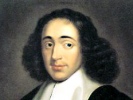
Sacred Texts Philosophy Spinoza Index Previous Next
Buy this Book at Amazon.com


Correspondence, by Benedict de Spinoza, [1883], at sacred-texts.com
[Spinoza, in answer to a letter from De Vries now lost, speaks of the experience necessary for proving a definition, and also of eternal truths.]
Respected Friend,—You ask me if we have need of experience, in order to know whether the definition of a given attribute is true. To this I answer, that we never need experience, except in cases when the existence of the thing cannot be inferred from its definition, as, for instance, the existence of modes (which cannot be inferred from their definition); experience is not needed, when the existence of the things in question is not distinguished from their essence, and is therefore inferred from their definition. This can never be taught us by any experience, for experience does not teach us any essences of things; the utmost it can do is to set our mind thinking about definite essences only. Wherefore, when the existence of attributes
does not differ from their essence, no experience is capable of attaining it for us.
To your further question, whether things and their modifications are eternal truths, I answer: Certainly. If you ask me, why I do not call them eternal truths, I answer, in order to distinguish them, in accordance with general usage, from those propositions, which do not make manifest any particular thing or modification of a thing; for example, nothing comes from nothing. These and such like propositions are, I repeat, called eternal truths simply, the meaning merely being, that they have no standpoint external to the mind, &c.